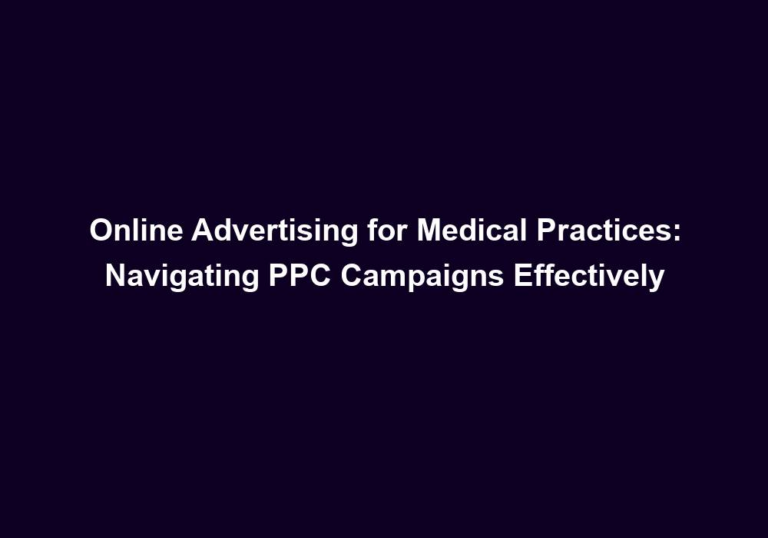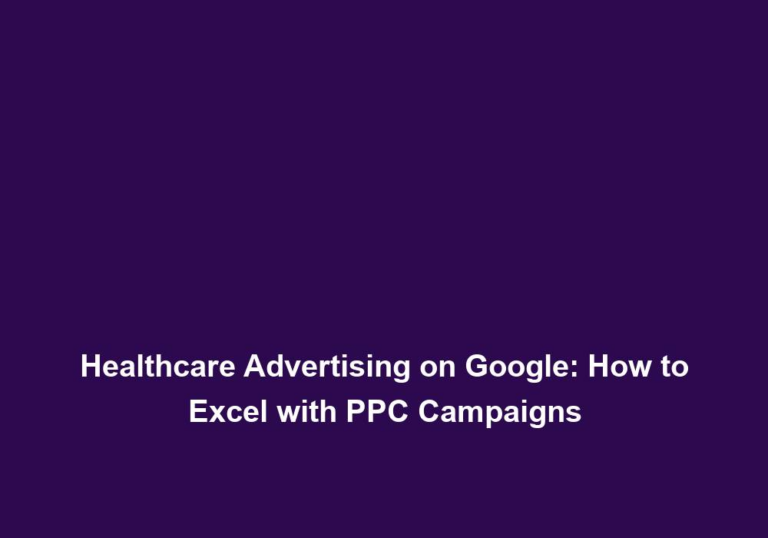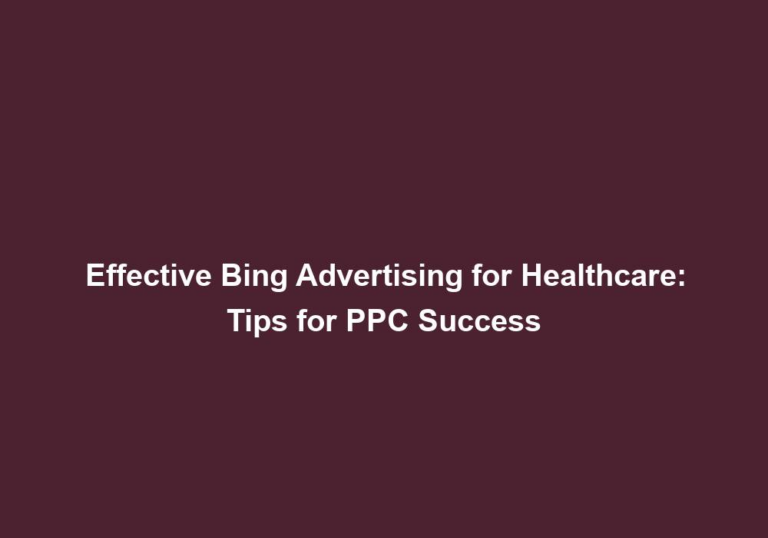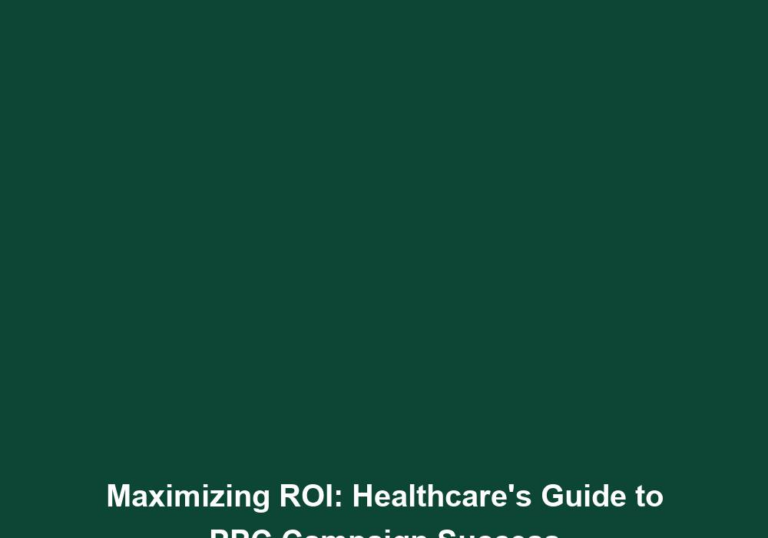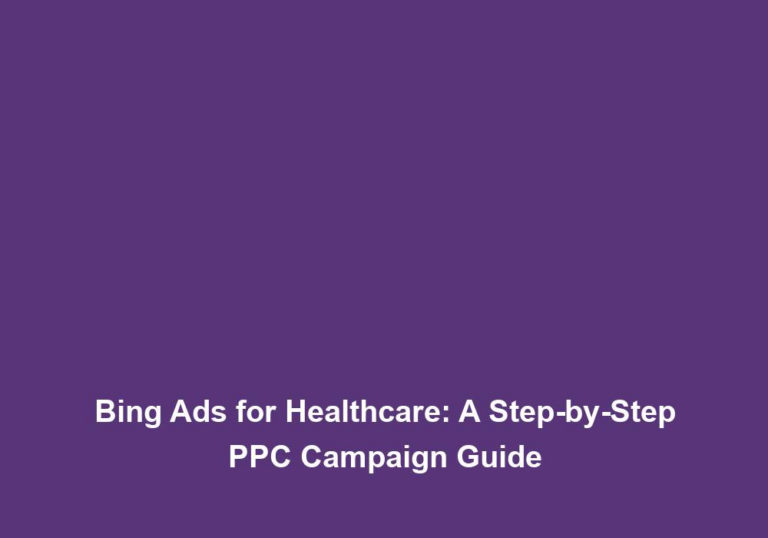Harnessing Bing Ads: Essential PPC Techniques for Healthcare Professionals
Bing Ads, the popular pay-per-click (PPC) advertising platform offered by Microsoft, presents a valuable opportunity for healthcare professionals to expand their online presence and reach a wider audience. With its wide user base and effective targeting options, Bing Ads can help healthcare professionals increase brand visibility, drive website traffic, and ultimately attract more patients. In this article, we will explore some essential PPC techniques that healthcare professionals can employ to harness the power of Bing Ads effectively.
1. Understanding Bing Ads and its Benefits
Before delving into the specific techniques, it is crucial to understand what Bing Ads is and how it can benefit healthcare professionals. Bing Ads is an online advertising platform that allows businesses to display their clickable ads on the Bing search engine results pages, as well as the Yahoo search engine. With a significant market share, Bing provides an excellent opportunity to tap into a large user base beyond Google.
Some key benefits of using Bing Ads for healthcare professionals include:
- Less competition: Bing Ads generally have lower competition compared to Google AdWords, which means healthcare professionals can achieve higher ad rankings at a potentially lower cost-per-click (CPC). This gives healthcare professionals a competitive advantage in the PPC landscape and can lead to more cost-effective advertising campaigns.
- Targeted audience: Bing Ads allows precise targeting options, such as location, demographics, device type, and even specific keywords related to healthcare services. This ensures that healthcare professionals can reach their intended audience effectively. By leveraging these targeting options, healthcare professionals can tailor their ads to specific segments of the population that are most likely to be interested in their services.
- Cost-effective: With lower competition and potentially lower CPC, healthcare professionals can achieve a higher return on investment (ROI) by utilizing Bing Ads effectively. By carefully managing their campaigns and optimizing their targeting and ad copy, healthcare professionals can maximize the impact of their advertising budget and generate more leads and conversions.
- Increased visibility: By appearing on Bing search engine results pages, healthcare professionals can increase their brand visibility and gain credibility among potential patients. This increased visibility can lead to higher brand recognition and trust, which are crucial factors in attracting new patients to a healthcare practice.
Now that we understand the benefits of Bing Ads, let’s explore some essential PPC techniques that can be employed by healthcare professionals.
2. Keyword Research and Optimization
Keyword research forms the foundation of any successful PPC campaign, and healthcare professionals must choose the right keywords to target their audience effectively. Here are some steps to optimize keyword selection:
- Understand your target audience: To effectively target potential patients, healthcare professionals need to identify the common search terms and phrases that they might use to find healthcare services. By understanding their target audience’s language and preferences, healthcare professionals can select keywords that are most likely to resonate with them.
- Use keyword research tools: Leveraging keyword research tools like Bing Ads Keyword Planner, Google Keyword Planner, or SEMrush can provide valuable insights into high-volume and relevant keywords for healthcare professionals’ campaigns. These tools can help identify keywords that have a high search volume and are relevant to the healthcare services being offered.
- Long-tail keywords: Long-tail keywords are more specific phrases with lower search volume but higher intent. For example, instead of targeting the keyword “cardiologist,” healthcare professionals can focus on long-tail keywords like “best cardiologist in New York.” By targeting long-tail keywords, healthcare professionals can reach a more specific audience that is actively searching for their specific services.
- Negative keywords: Excluding irrelevant keywords that may trigger healthcare professionals’ ads but are unlikely to convert is crucial. This helps optimize their ad spend and target a more relevant audience. By adding negative keywords to their campaigns, healthcare professionals can prevent their ads from appearing in searches that are not relevant to their services.
3. Compelling Ad Copy and Ad Extensions
Creating compelling ad copy is crucial to grab the attention of potential patients and entice them to click on healthcare professionals’ ads. Consider the following tips for effective ad copy:
- Craft a compelling headline: The headline is the first thing that potential patients see when they come across healthcare professionals’ ads. It is essential to use the headline to highlight their unique selling proposition (USP) and capture the attention of their target audience. For example, a headline like “Expert Cardiologists in New York: Book an Appointment Today!” immediately conveys expertise and urgency, encouraging potential patients to take action.
- Focus on benefits: Highlighting the specific benefits and solutions that healthcare services offer to potential patients is crucial. Using persuasive language to convince them to choose a particular practice over competitors can make a significant impact. By emphasizing the benefits of their services, healthcare professionals can differentiate themselves from their competitors and attract more patients.
- Call-to-action (CTA): Including a clear and actionable CTA in ad copy is essential to prompt potential patients to take the desired action. Phrases like “Book an Appointment,” “Contact Us Today,” or “Learn More” can create a sense of urgency and encourage potential patients to engage with healthcare professionals’ ads.
- Utilize ad extensions: Bing Ads offers various ad extensions, such as Sitelink Extensions, Call Extensions, and Location Extensions. Healthcare professionals should utilize these extensions to provide additional information, increase visibility, and drive engagement. By utilizing ad extensions, healthcare professionals can enhance their ad copy and provide potential patients with more ways to interact with their ads.
4. Landing Page Optimization
A well-optimized landing page is crucial for converting ad clicks into actual patient inquiries or appointments. Consider the following best practices for landing page optimization:
- Relevance: Ensuring that the landing page directly relates to the ad copy and keywords is crucial. This maintains a consistent user experience and reduces bounce rates. When potential patients click on an ad, they expect to be taken to a landing page that provides the information they were promised in the ad.
- Clear and concise content: Providing clear and concise information about healthcare services on the landing page is essential. Highlighting expertise, testimonials, and any unique offerings can help build credibility and trust with potential patients. By providing valuable and relevant information, healthcare professionals can increase the likelihood of converting ad clicks into actual inquiries or appointments.
- Easy contact options: Including multiple contact options, such as a phone number, email address, or a convenient contact form, makes it easy for potential patients to get in touch. By offering various contact options, healthcare professionals cater to the preferences of different potential patients and make it as convenient as possible for them to reach out.
- Mobile-friendly design: As a significant portion of users access the internet through mobile devices, optimizing the landing page for mobile responsiveness is crucial. This ensures a seamless user experience across all devices and prevents potential patients from bouncing off the page due to poor mobile optimization.
- Track conversions: Implementing conversion tracking is crucial to measure the effectiveness of healthcare professionals’ PPC campaign. This allows them to identify the best-performing keywords, ads, and landing pages and make data-driven optimizations. By tracking conversions, healthcare professionals can gain insights into the effectiveness of their campaign and make informed decisions to improve its performance.
5. Continuous Monitoring and Optimization
Once healthcare professionals’ Bing Ads campaign is up and running, it is essential to continuously monitor and optimize its performance. Here are a few techniques to maximize the effectiveness of the PPC campaign:
- Monitor performance metrics: Keeping a close eye on key performance indicators (KPIs) such as click-through rate (CTR), conversion rate, average position, and cost-per-click (CPC) is crucial. By monitoring these metrics, healthcare professionals can identify areas for improvement and make data-driven decisions to optimize their campaign.
- A/B testing: Experimenting with different ad variations, headlines, and landing page designs is crucial to identify what resonates best with the target audience. A/B testing allows healthcare professionals to optimize their campaign based on real user preferences and maximize its impact.
- Refine targeting: Analyzing the performance of ads across different demographics, locations, and devices is important. By refining targeting options, healthcare professionals can focus on the most relevant audience segments that generate the highest conversions. This can lead to a more efficient use of budget and better overall campaign performance.
- Optimize budget allocation: Allocating the budget strategically based on the performance of different keywords, ads, and ad groups is crucial. By adjusting bids and budgets, healthcare professionals can maximize ROI while maintaining a cost-effective campaign. Continuous optimization of budget allocation ensures that the most effective elements of the campaign receive sufficient resources.
In conclusion, healthcare professionals can harness the power of Bing Ads by implementing these essential PPC techniques. By understanding Bing Ads’ benefits, conducting thorough keyword research, creating compelling ad copy, optimizing landing pages, and continuously monitoring performance, healthcare professionals can effectively reach their target audience, increase brand visibility, and attract more patients to their practice.


